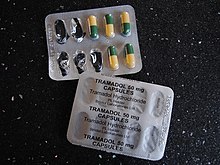Uncategorized
Tramadol 100mg Pill: Uses, Benefits, and Important Safety Information
Tramadol 100mg Pill, The tramadol 100mg pill is a commonly prescribed medication used to treat moderate to severe pain. As an opioid analgesic, tramadol works by altering the way the brain processes pain signals, providing relief to individuals who suffer from various pain conditions, including chronic pain, post-surgical pain, or injury-related pain. Understanding how the tramadol 100mg pill works, its benefits, and the risks associated with its use is essential for anyone considering or prescribed this medication.
What is Tramadol 100mg?
Tramadol is a synthetic opioid that targets the opioid receptors in the brain and spinal cord. The 100mg pill is a strong dose often given to patients with more intense pain who need a higher level of relief. Tramadol not only reduces pain but also increases levels of neurotransmitters like serotonin and norepinephrine, which help in pain management.
Uses of Tramadol 100mg Pill
Tramadol 100mg is prescribed for a variety of pain-related conditions, such as:
- Chronic Pain: Conditions like arthritis, lower back pain, or neuropathy are often treated with tramadol, as it provides long-term pain relief for patients suffering from ongoing discomfort.
- Post-Surgical Pain: After surgery, tramadol is often prescribed to control pain during recovery, helping patients regain mobility and comfort.
- Acute Injury Pain: Injuries like fractures or muscle strains may require strong painkillers, and tramadol is frequently used in these cases to alleviate severe pain.
Benefits of Tramadol 100mg Pill
- Effective Pain Relief: The tramadol 100mg pill is particularly effective for patients who need stronger pain relief than over-the-counter medications like ibuprofen or acetaminophen can provide.
- Long-Lasting Effects: Tramadol is available in both immediate-release and extended-release forms, allowing patients to have continuous pain relief throughout the day. The 100mg dose, particularly in extended-release form, provides relief for chronic pain sufferers who need sustained management.
- Lower Risk of Dependency: While tramadol is an opioid, it is considered to have a lower risk of dependence compared to stronger opioids like morphine or oxycodone. However, it is still essential to use tramadol as prescribed.
Possible Side Effects of Tramadol 100mg
Although the tramadol 100mg pill is effective for pain relief, it can also cause side effects. Some common side effects include:
- Drowsiness or Dizziness: Tramadol affects the central nervous system, which can make you feel sleepy or lightheaded. This is why it’s important to avoid driving or operating heavy machinery after taking it.
- Nausea and Vomiting: Gastrointestinal issues like nausea or vomiting may occur, especially when first starting the medication.
- Constipation: Opioid medications, including tramadol, can lead to constipation. Staying hydrated and increasing fiber intake can help manage this side effect.
- Headache: Some patients report headaches when taking tramadol.
In rare cases, more severe side effects can occur, such as:
- Respiratory Depression: Taking high doses of tramadol or combining it with other depressants (like alcohol or sedatives) can lead to shallow or slow breathing, which is dangerous.
- Seizures: Tramadol can lower the seizure threshold, making it more likely for individuals with a history of seizures to experience one.
- Serotonin Syndrome: Because tramadol affects serotonin levels, combining it with other drugs that also increase serotonin (like certain antidepressants) can lead to serotonin syndrome, a potentially life-threatening condition.
How to Take Tramadol 100mg Safely
To maximize the benefits of tramadol and minimize risks, follow these guidelines:
- Follow the Prescription: Always take the medication as directed by your healthcare provider. Do not increase the dose without consulting your doctor.
- Avoid Alcohol and Other Sedatives: Drinking alcohol or taking other CNS depressants while on tramadol can increase the risk of serious side effects like respiratory depression.
- Monitor for Side Effects: If you notice any unusual symptoms, such as extreme drowsiness, confusion, or difficulty breathing, contact your doctor immediately.
- Avoid Stopping Abruptly: If you have been taking tramadol for an extended period, stopping suddenly can cause withdrawal symptoms such as anxiety, restlessness, and sweating. Always consult your doctor about tapering the dose if you need to stop taking the medication.
Conclusion
The tramadol 100mg pill is a powerful and effective pain reliever for individuals experiencing moderate to severe pain. While it offers significant benefits, including long-lasting relief and versatility in treating various pain conditions, it’s important to be aware of its potential risks and side effects. Always use tramadol under the supervision of a healthcare professional and follow the prescribed guidelines to ensure safe and effective pain management.

